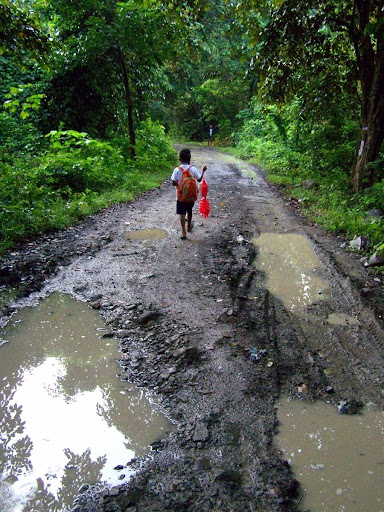A young boy, carrying a parol, walks to school along a dirt road pockmarked with puddles.
What’s wrong — or rather, what’s right — with this picture? Everything, if we go by the US Department of State’s choice of winning photo.
Filipina student Mikas Matsuzawa was chosen as one of 12 winners of an international photography competition, with a photograph depicting democracy based on what she describes as the “dismal state" of education in the Philippines today.
The Democracy Photo Challenge 2010, organized by the State Department, asked contestants to “Take a photo that completes the phrase ‘Democracy is…’ and share it with the world."
Matsuzawa, who is taking up journalism at the University of the Philippines Diliman, submitted a photograph of a young boy in school uniform, carrying a Christmas lantern, walking to school along a narrow dirt road lined with dense foliage and riddled with puddles. (See photo here.)
The photo’s caption reads, “"Democracy is... accessible and quality education for all. It is education as a right."
Matsuzawa said she took the photo during an immersion program with the Dumagat tribe in the mountains of Eastern Rizal.
“The children there had to walk for about two hours, some of them barefooted, just to get to the nearest school," said Matsuzawa.
“This young boy captured my attention because despite the muddy road and wearing only slippers, he still takes care to protect his parol (Christmas lantern) project to school," she added.
“For me, accessible and quality education is a right of every person, of every child, who societies proclaim to be the hope of the generation, the young movers and shakers of the world. And for me, in a genuine democracy education should be treated as a right," she said.
Matsuzawa cited her own school, UP, as an example of how democracy in the Philippines, based on the state of the education sector, seemed to be "merely illusory."
The budget for UP, the country’s premier state institution for tertiary education, has been slashed by P1.39 billion for 2011, with the current allocation of P6.9 billion further reduced by the government to P5.25 billion for next year.
UP had requested P18.2 billion and P18.5 billion for its operations for 2010 and 2011, respectively.
“I think that the accessibility is an important element of education but with continuous budget cuts, many cannot access this basic right," Matsuzawa said.
Matsuzawa’s photograph won over 3,000 other entries from 131 countries. The winners were chosen based on online public voting by over 500,000 people, after a jury narrowed the field of submissions to 36 finalists, representing each region of the world.
The other winners are Mustafa Kia, Afghanistan; Mohamed Kaouche, Algeria; Venkatesh Hamyanaik, Australia; Mehman Huseynov, Azerbaijan; Mike Mitchell, Benin; Dino Perić, Bosnia and Herzegovina; Wladia Drummond, Brazil; Kaveh Baghdadchi, Iran; Jun Krishna Joshi, Nepal; Kaylene George, South Africa; and Ian M. Cunningham, United States.
The photos taken by Matsuzawa and the other 11 finalists will be exhibited at the United Nations and at galleries in New York and Los Angeles. Other winning photographs include images depicting democracy as linked to press freedom, elections, protest actions, and other such themes.
The Democracy Photo Challenge aims to use “social networks and creative challenges to allow global publics to share, consider, debate, and learn from diverse perspectives on democracy," said the US Department of State in a press release.— JV, GMANews.TV (click me..full story)
Results 1 to 10 of 13
-
09-17-2010, 04:14 PM #1
 Pinay student wins intl photo ‘democracy challenge’
Pinay student wins intl photo ‘democracy challenge’
-
09-17-2010, 05:58 PM #2
-
09-17-2010, 06:21 PM #3
much way better than fashion... that is...congrats to her.
-
09-17-2010, 07:11 PM #4
-
09-17-2010, 07:15 PM #5
gosh my heart bleeds over children who have to walk two hours to school. and back. tsk! haaaaayyyy
-
09-17-2010, 07:15 PM #6
-
09-17-2010, 11:06 PM #7
-
09-17-2010, 11:10 PM #8
-
09-17-2010, 11:15 PM #9
-
09-18-2010, 12:03 AM #10
u see from the picture - you really don't need exeptionally expensive DSLR to will contests or expensive lenses.
it is always the eye behind the trigger, don't you guys think?
to Ms. Matsuzawa Congratulation for a job well done
Advertisement
Similar Threads |
|







 Reply With Quote
Reply With Quote


